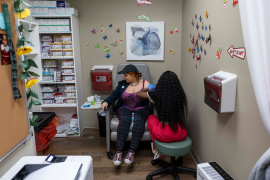New York, April 21, 2008—In order to achieve significant gains in quality and efficiency, the health care delivery system—the way providers are organized and care is delivered—will need fundamental and systemic changes, say health care and health policy leaders.
The call for reform is unequivocal: Nearly nine of 10 (89%) respondents to the latest Commonwealth Fund/Modern Healthcare Health Care Opinion Leaders Survey agree on the need for fundamental change. None of the leaders surveyed said no changes were needed, and only a slim portion—8 percent—said modest changes to the delivery system would be sufficient.
"Although universal coverage is a prerequisite for a high performance health system, coverage needs to be coupled with care that is accessible and well coordinated," said Commonwealth Fund President Karen Davis. "The majority of health care opinion leaders believe that our delivery system is broken, but fortunately there are ways to ensure that all Americans have patient-centered practices accountable for their care."
When polled about specific strategies for improving the organization of the system, a large majority of health care leaders said that strengthening primary care (90%), encouraging care coordination and the management of care transitions (90%), and promoting care management of complex patients (88%) were very important or important to improving health system performance.
Reforming the way doctors and other providers are paid is an important factor in delivery system transformation, particularly as the traditional payment scheme—fee-for service—creates incentives to provide more services, rather than better, higher-value ways to treat conditions. Opinion leaders voiced strong support for payment reform: 79 percent view it as an important or very important tactic in changing the delivery system. Specifically, 84 percent support providing supplemental payments to primary care providers for delivering comprehensive, coordinated, and accessible care. In addition, 84 percent support incentives for avoiding unnecessary hospitalizations and re-hospitalizations.
Health care opinion leaders agree that an organized delivery system—one with enhanced access to care, care coordination, and health information exchanges, and one in which hospitals, practices, and providers work together to improve quality and efficiency—is more likely to deliver high-quality, efficient, and patient-centered care than a non-organized system. To foster participation in such systems, seven of 10 health care opinion leaders support capitation or other special payment arrangements for organized delivery systems. Additionally, 63 percent of respondents called for government-provided infrastructure support in areas where organized delivery systems don't naturally occur. Of those leaders who support government funding of infrastructure for coordinated care, 80 percent say information technology services should be a high or very high priority.
Despite previous Commonwealth Fund research showing the potential of medical homes to deliver high-quality, coordinated, and accessible care, many individuals in the U.S. don't receive this type of care. Consequently, there has been rapid growth of retail health clinics (e.g., drop-in clinics at Wal-Mart or other stores) over the past two years. Three-quarters of opinion leaders surveyed say that retails clinics are more convenient for patients, and half say they provide services at lower cost. However, half the experts also say that, absent efforts to integrate with patients' primary care doctors, the clinics further fragment the delivery of care in the U.S.
Opinion leaders surveyed included experts from four broad health care sectors: academia and research organizations; health care delivery; business, insurance, and other health industry; and government and advocacy groups. Elected officials and media representatives were excluded.
The survey is the 14th in a series from The Commonwealth Fund, and the sixth conducted in partnership with the publication Modern Healthcare. Commentaries on the survey results by Gregory P. Poulsen, M.B.A., a senior vice president at Intermountain Health Care and member of The Commonwealth Fund Commission on a High Performance Health System, and Martin-J. Sepulveda, M.D., vice president for well-being services and health benefits at IBM Corp., appear in the April 21 issue of Modern Healthcare. The commentaries are also posted on the Fund's Web site, along with a Commission data brief discussing the survey findings.
Methodology: The Commonwealth Fund/Modern HealthCare Health Care Opinion Leaders Survey was conducted online within the United States by Harris Interactive on behalf of The Commonwealth Fund between March 3 and March 31, 2008, among 1,078 opinion leaders in health policy and innovators in health care delivery and finance. The final sample included 211 respondents from various industries, for a response rate of 20 percent. Data from this survey were not weighted. The complete methodology is available on The Commonwealth Fund Web site.


